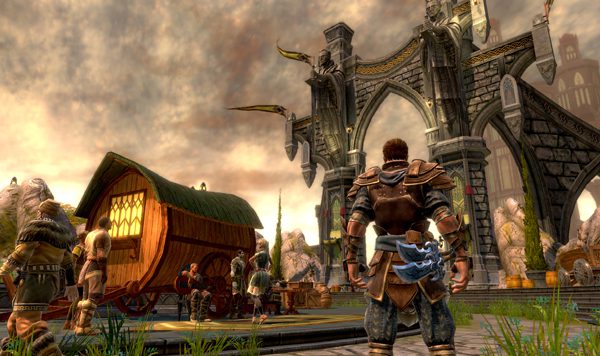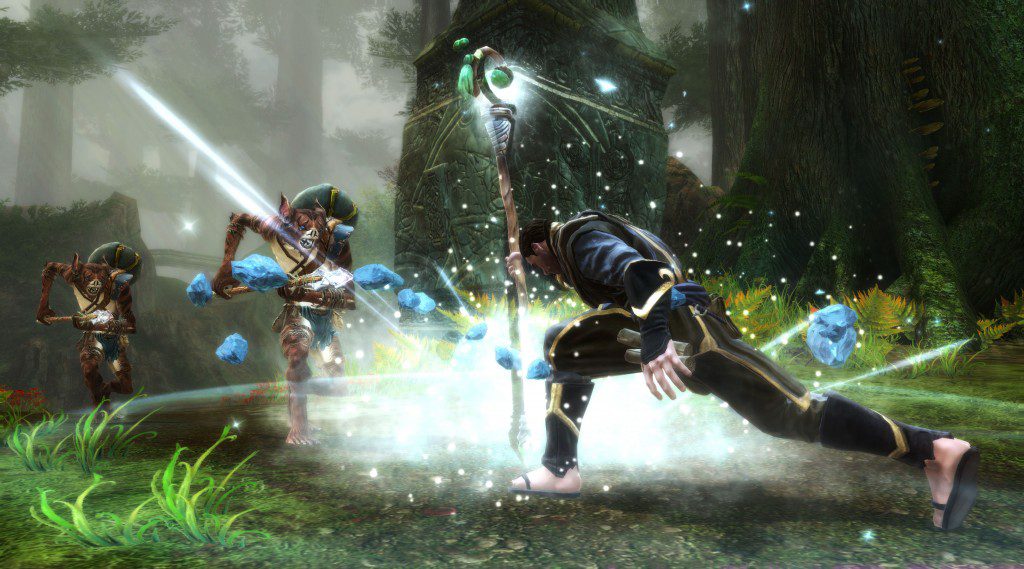Hype is a dangerous thing. Setting the bar too high assures that success is impossible. When Curt Schilling, a man that was never known for a lack of confidence, set out to make an RPG, he treated it like an All-Star Game. He brought the most high profile talent he could grab. Fantasy powerhouse R.A. Salvatore, comic visionary Todd McFarlane, and Elder Scrolls luminary Ken Rolston make the design team read like a who’s who list rather than the credits of a fantasy RPG. With such a high caliber of talent and experience, Kingdoms of Amalur: Reckoning had a lot to live up to, and just like most All-Star games, parts are exhilarating, but the end product ends up a bit of a letdown.
It is nearly impossible not to draw parallels between Amalur and its contemporaries that it borrows so heavily from, mainly World of Warcraft, Elder Scrolls and Fables. There is no part of Amalur that doesn’t obviously play off one of those three, to varying degrees of success. Even the story hinges on every fantasy trapping that’s been cultivated over Salvatore’s decades of work.
Beginning the game with the heavily relied upon amnesia spin, Amalur quickly throws the player into the mystery at the games center, namely who killed you and how were you resurrected by the Well of Souls. Your character is no longer “bound by fate,” and instead can create their own destiny, giving them incredible power that has never been witnessed before. It is an intriguing premise, especially in light of the upcoming MMO that takes place 10,000 years after the events in the game. We know that the Well of Souls will play into the MMO, and having the single player experience set the stage for the future release is clever.
Traipsing through the world of Amalur presents you with a glut of options. Burning through the main story takes about 15 hours, less if you stay focused. However, staying focused proves to be almost impossible. Every few steps a new character appears with a favor to ask, providing an almost obnoxious parade of fetch quests and “kill X number of bad guys” missions. Despite the almost intimidating size of the world, the quests you find in the first village are no different from the quests you encounter in the later areas. All that changes is the scenery.
That repetition is at the core of Reckoning. Enemies are brilliantly designed, but repeated over and over in different colors instead of introducing new ones. The loving design of the opening areas slowly degrades as you open up new sections. Todd McFarlene is talented, but no one has ever accused him of being burdened by an over abundance of new ideas. Monsters and scenery not only repeat, but are very recognizable from his work in comics and figures. Adding in Salvatore’s overwrought and predictable fantasy clichés pulled from his many books, and the story and world quickly become boring. After a few hours completing side missions and faction quests, I was anxious to finish the game up. Despite being a brazen homage to games like Skyrim, Reckoning fails to copy the addictive nature of the quests and exploration that can keep a player invested for over 100 hours.
Where Reckoning steps out from the pack is in its combat. Mimicking the real time combat of Fables, Reckoning manages to actually work, and work brilliantly. Giving players a wide variety of weapons like swords, bows, hammers and staffs, as well as new concepts like chakrams (my personal favorite) and Faeblades, the variety and possibilities are near endless. Players can wield two weapons, magic and a shield, shifting between them almost instantly. As you level up, more options become available, including more combos and more powerful magic. There is a real impact and gravity to the engagements and that is what makes the game worth playing through.
Along with the long litany of weapons to pick from, your character is also able to become supercharged by activating “reckoning” mode. This makes you incredibly powerful as well as slowing down time for a brief period. Once your enemies are beaten down, you are able to take advantage of a Quicktime event, adding to the total amount of experience you gain. Using reckoning mode effectively can make a world of difference toward gaining levels, and adds yet another layer to the most well executed aspect of the game.
Leveling is also intuitive and diverse enough to let you tailor a character to a ridiculous degree. There are skills, ala lockpicking, blacksmithing and alchemy, as well as three major talent trees. The trees are divided into Might, Sorcery and Finesse. While it is certainly possible to stick to one area, dividing your character up to grab different traits allows for almost any character one can think of. Reckonings greatest play might have be the marriage between the story and the way your character progresses. At any point you can “unweave” your fate, stripping your character back to zero and letting you reallocate points anywhere you want, creating a brand new character at any time. It isn’t an unheard of concept, but the way it plays into the game story and mechanics. The game world isn’t interrupted, and in fact changing your fate actually adds to the story and development.
Considering the amount of evil thrown your way, it’s fortunate dispatching them is so satisfying. Every nook and cranny is infested with them. Many quests will send you into caves or castles in search of your objective. They all tend to follow a similar template, not as repetitive as Dragon Age 2, but once you understand the architecture behind the dungeons, finding your way through them and knowing where the hidden items will be becomes a cake walk. Some people may enjoy the ability to navigate so easily, but I became very anxious and bored having to chop through the same area over and over. The lack of any puzzles or real challenge does a major disservice to the creativity found in other areas of the game.
Amalur is the very definition of a mixed bag. There is a great deal of fun to be had hacking and slashing through various areas, and the leveling can help cut the tedium and add new wrinkles to the game, but the story quickly becomes a parody of itself, and the landscape and paths go from breath-taking to boring very quickly, and without any quest variety, many people will find themselves sprinting to the end. For their first foray into games 38 studios made a fantastic game, one that most RPG fans will enjoy. Yet for every exciting moment, there are two points that don’t quite measure up. Kingdoms of Amalur: Reckoning doesn’t quite match the hype, but it sets the table for what could be the future of RPGs.
Review
| Pros | Cons |
|---|---|
| Brilliant combat design. Occasionally breathtaking surroundings. Great set up to a larger world | Repetition ruins the later levels. Over ambition shows through too often |
| Rating |





